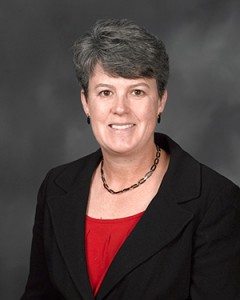
For most students, dashing across campus for an early lecture or chasing a deadline constitutes regular exercise. But for student-athletes, the balance between exercising their minds and their bodies can be tricky.
Dr. Christine Copper, President of the NCAA’s Faculty Athletics Representatives Association (FARA) and the organization with which she’s affiliated serve as a collective academic voice in all three NCAA divisions. The FARA works with faculty athletic representatives to address their concerns at the national level.
“You have to have a focus on education,” Copper said. “People lose sight of the fact that the NCAA is a part of higher education.”
Copper, the faculty athletic representative at the U.S. Naval Academy, where she also serves an appointment as a chemistry professor, shared her ideas with Sport and Recreation Management students from Temple University’s School of Tourism and Hospitality Management (STHM) during a Nov. 17 visit to Alter Hall. Copper spoke to the students as an invited guest of Dr. Jeremy S. Jordan, STHM Associate Professor and Temple’s faculty athletic representative.
“It’s helpful to understand the industry from a different perspective,” Jordan said to the attendees. “You’ll remember this as you go on to manage athletic programs.”
Copper shared how academic integrity is one of seven main areas of concern for the NCAA FARA and its student-athletes. Among the others are: time management, physical and mental health, amateurism, affordability and opportunities to play.
Led by a 24-member board of directors, the NCAA oversees 489,000 student-athletes across 24 sports. The board of directors focuses on the strategic-level topics in college sports and their relationship to education. Within its hierarchical structure are several association-wide committees dedicated to student-athlete life, such as committees on women’s athletics, post-graduate scholarships, sportsmanship and medical safeguards.
As a faculty athletic representative, Copper is involved in the academic integrity of the athletic program, ensuring the well-being of student-athletes and institutional control of the athletics program. Within this role, Copper and her fellow faculty athletic representatives strive to maintain NCAA values across all sports, reaffirm the goal of collegiate sports, improve student-athlete career development and enhance academic success for college athletes.
In executing these responsibilities, faculty athletic representatives around the country can voice concerns regarding time demands placed upon athletes, opportunities to play, affordability for all schools, athletes’ physical and mental health and the NCAA’s adherence to the amateurism model.
“We encourage faculty to get involved in the decision-making process,” Copper said. “It’s the responsibility of each individual campus to say how a decision at the national level may affect academics.”